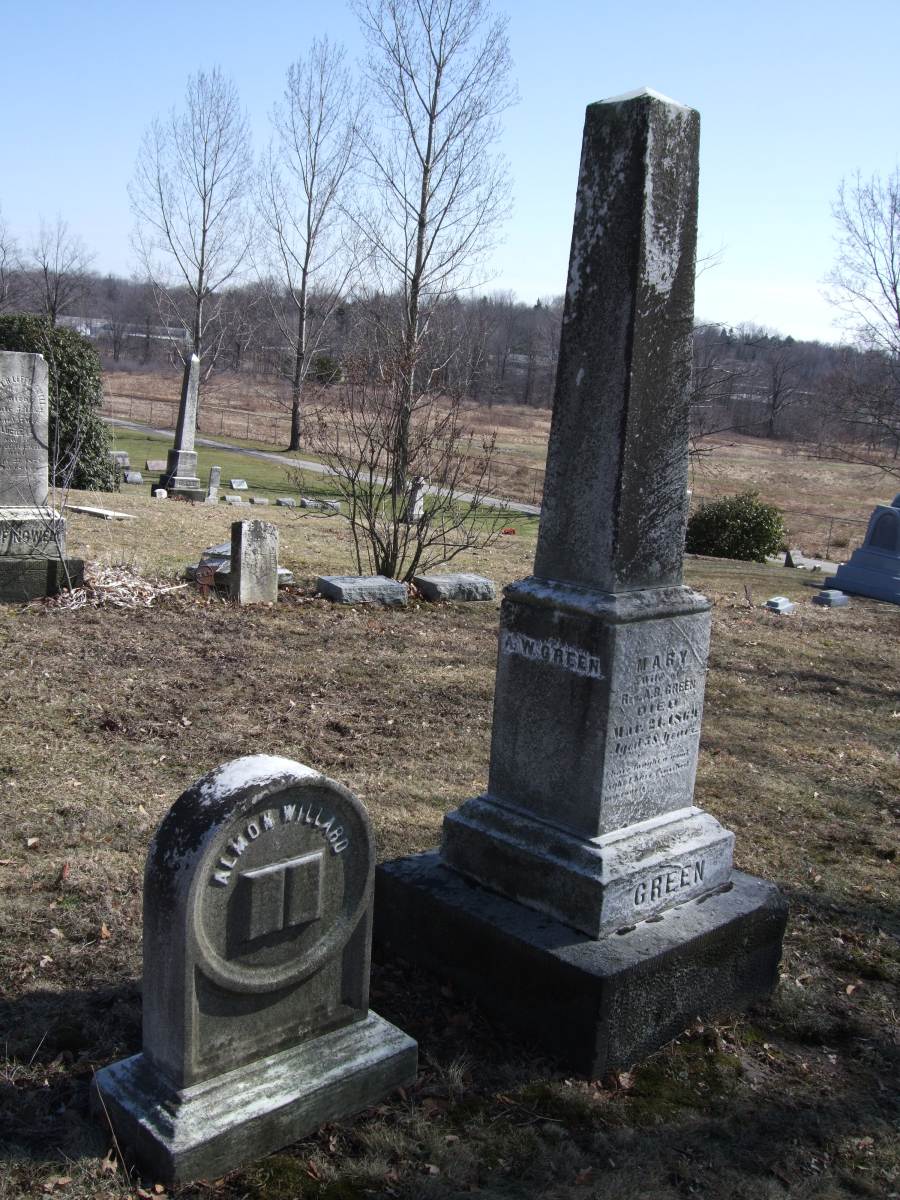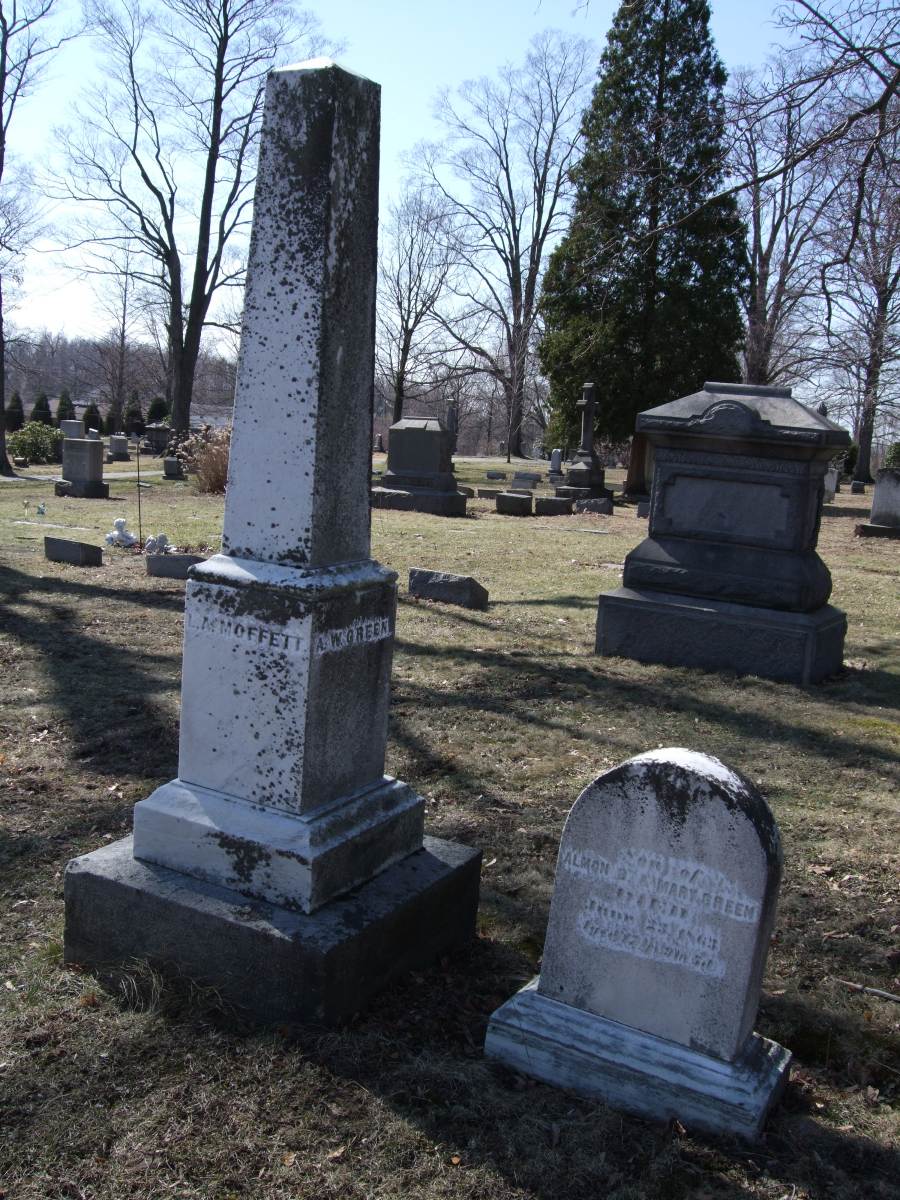Almon Beach Green
1808-1898
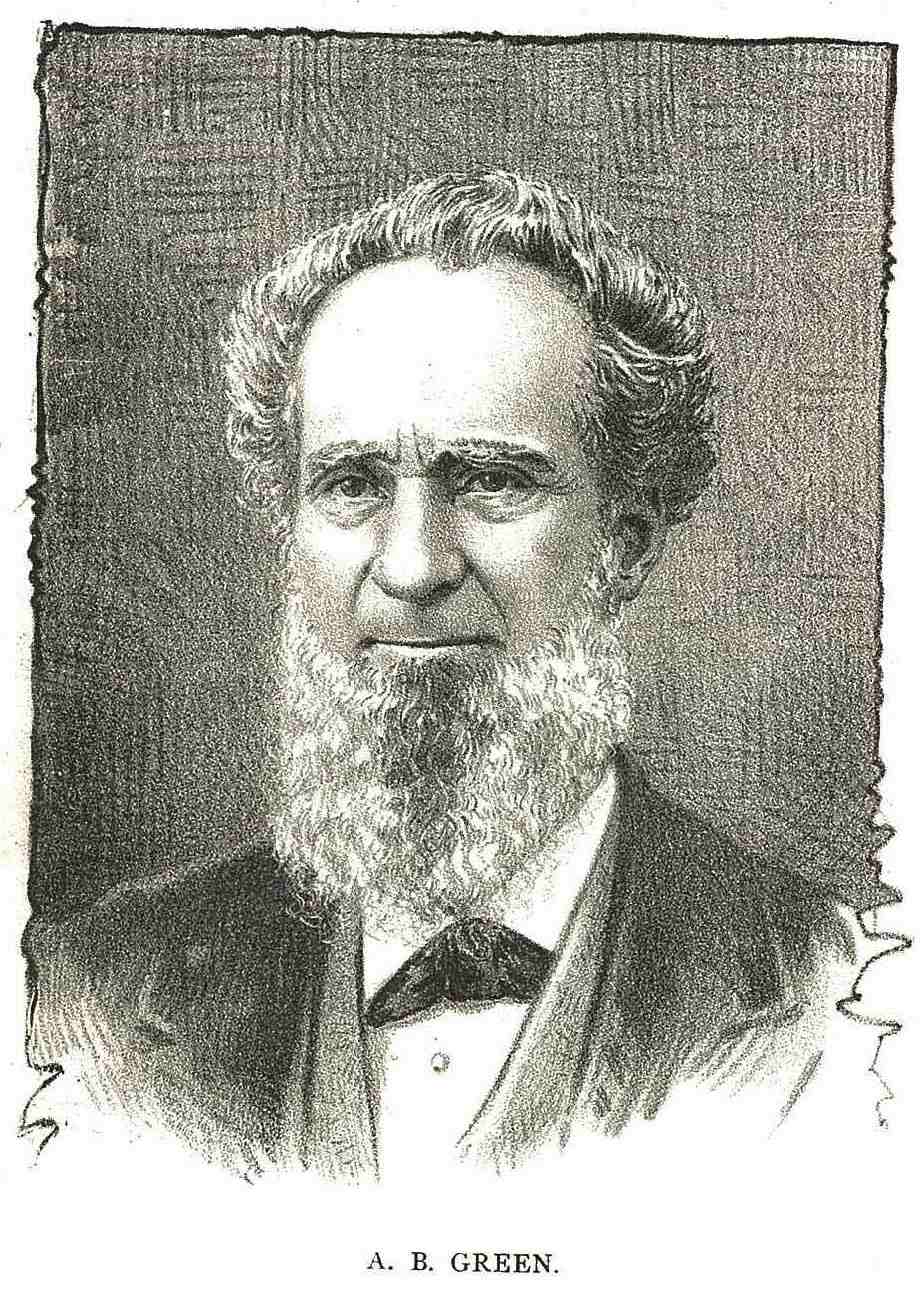
The Life Of A.B. Green
Almon Beach Green was born in Litchfield, Conn.,
January 12, 1808. His parents settled in Canfield, Ohio, in the fall of
1810, and after nine years moved to Norton, Summit County, Ohio. He was
baptized by Elder O. Newcomb, December 28, 1828. He preached his first
sermon April 5, 1832. In the spring of 1833 he received a letter from
the church commending him as a faithful and accepted minister of the
gospel; and September 10 of the same year started out to make the
preaching of the gospel his life work. He served as evangelist at large,
often at his own charges, two-thirds of his time for twenty-nine years,
when he moved to Ravenna, and took charge of the church five years.
Afterward he served the churches at Warren, Collamer, Bedford, Aurora
and Willoughby, closing his pastoral ministry at the last named place
after eight years of faithful and efficient service. He is now at the
age of seventy-seven, on the retired list, residing in Cleveland; near
his daughter and only living child, Mrs. R. Moffett.
In 1835 he married Mary Bennett, daughter of Henry Bennett, who shared
lovingly with him the burdens and joys of a minister's life, till March
21, 1869, when she fell asleep in Jesus. This was a severe blow to Mr.
Green. Few women were better qualified in heart and hand to be a
help-meet for a pioneer minister. Truly can we say, in the language of
Solomon: "Strength and honor were her clothing. She opened her mouth
with wisdom, and her tongue was the law of kindness. She looked well to
the ways of her household, and ate not the bread of idleness. She laid
her hands to the spindle, and stretched out her hand to the poor."
Indeed, but for the faith and courage and diligence of this excellent
woman, Mr. Green would many a time have despaired in his work.
In 1871 he married Mrs. Amanda Baldwin, widow of the late Henry Baldwin,
of Solon, Ohio, who now shares his comfortable home, and ministers as a
faithful wife.
A. B. Green is not what the world calls an educated man. He says he was
far more familiar with the howling of wolves and hooting of owls than
with schools or school books. His only library when he began to preach
was his pocket Bible and "Robbin's History of all Religions and
Ceremonies." He was, however, a great student of the Bible. He can even
now, at his advanced age, quote entire chapters without prompting. It
was to him the one sword of the Spirit which could vanquish all opposers
of its truth, and many an adversary has felt its keen edge when wielded
by his hand. Six times in his ministry he has met successfully the
champions of Universalism; five times the champions of sprinkling and
infant baptism, and once an apostle of Mormonism. He is preeminently a
preacher of the Word. Although unacquainted with classic lore, and
untrained even in the things of common grammar, he has so learned the
Scriptures, and is so skilled in interpreting Scripture by the
Scriptures themselves, that his judgment as to the meaning of any
passage may be safely set over against that of the recognized
theologian. His style is plain, clear, logical, and full of force. He
survives among the last of the grand men to whom the Disciples of Christ
owe a lasting debt of gratitude for self-sacrificing devotion to the
restoration of primitive Christianity. The sermon here presented is one
of the olden time.
![]()
Sketch of A.B. Green
A. B. Green was born in Litchfield County, January 12, 1808. His parents moved into Ohio in 1811, and settled soon after in Norton, Medina County. Amidst the hardships of life in a new country, he was brought up and in the midst also of the conflicts of Calvinism and Arminianism, and the resultant compound, Universalism. No wonder that, like many others, he became skeptical.
On Sunday, his father, a steady church-goer, said, "Almon, are you not going to meeting?" "No, father, I think I will stay at home and read." The "Family Testament," a new translation of the New Testament by Drs. Campbell, of Aberdeen, Macknight and Doddridge, compiled and published by Alex. Campbell, had recently made its appearance, and was attracting much attention. During the quietness of that blessed day, whose associations all are favorable to calm and candid contemplation, Green read this new and attractive book. New light came into his mind, and a new interest was awakened in his heart. He arose after hours of serious perusal of it, exclaiming aloud to himself, **No uninspired man ever wrote that book." The stormy and dangerous cape of infidelity being "doubled," he sailed rapidly past the shoals and sharp rocks of "total depravity," "final perseverance," etc., the drift and debris of theological periods, into safer channels. Reading regularly on, with interest deepening at every step, he came to Acts ii:38; "Repent, and be baptized every one of you in the name of Jesus Christ for the remission of sins, and you shall receive the gift of the Holy Spirit." He asked Elder Newcomb what this Scripture means. "It means what it says," replied the Elder, with his characteristic promptness. This reply sent the meaning deep into his heart. In a few days he sent a letter to Elder Newcomb asking for baptism at his hands, which event took place December 28, 1828.
His mouth opened in praise, and in pleading the claims of the Savior of sinners. He soon went by invitation to Chippewa, Granger, and other places. Elder Newcomb was his counselor and steady help. Moved by him, the church granted a letter of commendation to the young Timothy, to go forth proclaiming the glad tidings. His first mission-trip opened at Stowe, September 10, 1833. One came for baptism. This was his first baptism. His tour was about three weeks; from it he returned, his natural timidity having yielded very much to an assured confidence that God was opening the way for him into fields of extensive usefulness. From this period he has belonged to the public. In all the counties of North-east Ohio, much in other parts of it, in other States also, and in Canada, he has "fully preached the gospel of Christ." For more than forty years he has been zealously engaged and personally identified with all the movements—missionary, educational, and social—tending to build up the churches, and extend the knowledge of the Redeemer's kingdom.
The church in Wadsworth arose as follows: There had been a Baptist church in the community, principally in the care of Elder Obadiah Newcomb, a very worthy man, of good gifts and excellent sense. In the fall of 1818, he came from Nova Scotia to Pittsburg, where he preached for a time, and associated with the ministers of the city. He came to Wadsworth in the spring of 1822, where he planted a Baptist church. The "Christian Baptist" appeared soon after, and Mr. Newcomb obtained and read it. Its views of New Testament truth arrested his eager attention. Too conscientious to preach the doctrines of the "creed," now that he found them not among the apostolic "traditions," he slackened in his ministry till these new and scriptural views became well formed in his mind. The church ran low. The "Elder" was nearly silent, save at funerals and special occasions. But the "Christian Baptist" was faithful in its visits. It was read by him, by his family, and by others. William Hayden came among the people about this time, and the smoldering fires burst forth in flames. There was agitation every-where. Mr. Newcomb exchanging the mien of a clergyman for the panoply of the gospel, lifted the sword of the Spirit and went into the battle. Green was baptized; others followed. Williams came, and in Wadsworth, where the people formally heard Universalism from his eloquent lips, they now heard the original gospel in its simplicity, as it was first told by the holy apostles. The church of Wadsworth was formed in February, 1829. The first day there were eight members : Obadiah Newcomb; his two daughters, Statira and Matilda, recently baptized; P. Butler, Samuel Green, A. B. Green, and John and Sarah Bunnell. Bro. Newcomb was appointed elder, and John Bunnell, deacon of the new organization."
This church soon became a strong pillar. William Eyles, late judge of court, soon united with his family. Conversions were almost constant. The opposition was" active, vigilant, and often virulent, but over all the gospel" made steady and triumphant progress.
The first yearly meeting held in Wadsworth was in September, 1833, in a new barn belonging to Bro. William Eyles. The meeting was noted for the numbers who attended it, and for the stimulus it gave to the cause of reformation. Being quite removed from the sources and center of the work, the proclamation was new to large numbers who came a long distance to attend it. A. Campbell was present; also William Hayden, John Henry, Marcus Bosworth, E. B. Hubbard, J. J. Moss, and many others. There were many converts.
An incident occurred at this time which displays Mr. Campbell's character for discernment and candor. Aaron" Pardee, a gentleman residing in the vicinity, an unbeliever" in the gospel, attracted by Campbell's abilities as a" reasoner, and won by his fairness in argument, resolved to" obtain a private interview, and propose freely his difficulties." Mr. Campbell received him with such frankness" that he opened his case at once, saying: "I discover, Mr. Campbell, you are well prepared in the argument and defenses of the Christian religion. I confess to you frankly there are some difficulties in my mind which prevent my believing the Bible, particularly the Old Testament." Mr. Campbell replied: *'I acknowledge freely, Mr. Pardee, there are difficulties in the Bible—difficulties not easy to explain, and some, perhaps, which in our present state of information can not be cleared up. But, my dear sir. when I consider the overwhelming testimony in their favor, so ample, complete, and satisfactory, I can not resist the conviction of their divine origin. The field of prophetic inspiration is so varied and full, and the internal evidences so conclusive, that with all the difficulties, the preponderance of evidence is overwhelmingly in their favor." This reply, so fair and so manly, and so different from the pulpit denunciation of "skeptics," "infidels," etc., to which he had been accustomed, quite disarmed him, and led him to hear the truth and its evidence in a much more rational state of mind. Within a year he became fully satisfied of the truthfulness of the Holy Scriptures, and apprehending clearly their testimony to the claims of Jesus of Nazareth as the anointed Son of God, he was prepared to yield to him the obedience of his life. At a two days' meeting held there by Bro. A. B. Green and A. S. Hayden, Mr. Pardee and four others were baptized.
Elder Newcomb being fully relieved of the irreconcilable perplexities of the Calvinistic system, was now like an eagle fresh from the moulting. His joy was unbounded, and his zeal was equal to that of a new convert. He rode horse-back sixty miles, to the great meeting in Austintown, in 1830, accompanying a full two-horse wagon, loaded with members of his own family and others, to the same meeting. He preached, visited, and talked continually. He had an element of sternness in his character. Going to the school-house early Sunday to meeting, he took his usual seat. He descried a young man across the room with a flashy guard-chain displayed in a conspicuous manner over his vest. He looked at his Testament, then cast a glance to the gay toy. After a fewmoments he closed his book, walked across the house, and without uttering a word, gathered the glittering ornament off the young man's neck, put it all down into the owner's pocket out of sight, then walked back to his seat, and quietly resumed his preparation for the meeting. He once accompanied Bro. Green in a preaching tour to Bethany and the region round about. At a night meeting on Salt Run, Ohio, he arose before a full house, announced the hymn in usual manner, and requested some brother to "set the tune." No one starting, he repeated the first two lines, saying: "I hope some brother will raise the tune." All were silent. Closing the book he said: "The apostle James says; 'Is any merry, let him sing psalms; is any afflicted, let him pray.' I think the people here must be afflicted—let us pray!"
This excellent man passed away universally respected. He died October 4, 1847, aged seventy-four years.
The congregation in Wadsworth has been a light to all the region round about. It is mother of churches, and mother of preachers. The following proclaimers of the gospel received their earliest aid and encouragement there, and some of them were brought forth almost exclusively by this church : A. B. Green, Wm. Moody, Holland Brown, Philander Green, B. F. Perky, and Pardee Butler. Bro. L. L. Carpenter, also, from the church in Norton, a daughter and dependency of Wadsworth, gained his guiding impulse there to his distinguished usefulness.
A.S. Hayden, Early History of the Disciples In The Western Reserve, pages 363-368
![]()
The Kingdom Of God And The Changes Necessary To Citizenship
A Sermon by A.B. Green
"Now this I say, brethren, that flesh and blood can
not inherit the kingdom of God; neither doth corruption inherit
incorruption. Behold I show you a mystery; we shall not all sleep, but
we shall all be changed."
1 Corinthians 15: 50, 51
The phrase, "The kingdom of God," is sometimes used for the reign of God by Christ in the hearts and lives of his people in this world. Hence the language, "The kingdom of God is within you." There was a time when it was said, "The kingdom of God is at hand is so near that Jesus said, "There are some standing here that shall not taste of death until they have seen the kingdom of God come with power." And so it was that Jesus. the promised King, ascended into heaven, and God, the Father, said to him, "Sit thou at my right hand until I make thine enemies thy footstool;" then turned and gave command, "Let all the angels of God worship him." Possessing all power in heaven and in earth, angels and authorities being subject to him, he shall reign until the last enemy man has to encounter, Death, shall be destroyed. "Then cometh the end, when he shall have delivered up the kingdom to God, even the Father, and God shall be all in all." Here we arc introduced to the kingdom of God spoken of in the text. In his kingdom among men, he reigns in the hearts and lives of the sanctified in Christ Jesus. In the world to come he will reign over the glorified by Christ Jesus.
When we consider the heart of man, and his condition by sin, his character before God, and his bodily infirmities, we shall not wonder that the transition from this world to that of glory should call for several changes. to fit man for the enjoyment of eternal life in the world to come. There is a wide difference between man as he was, and as he is; but a still wider difference between man as he is, and as he is yet to be, if he ever enters the Paradise of God. Man as he was, knew no guilt, and was a stranger to remorse. In the image of God "he could stand and worship him in all the joy of perfect innocence." But, oh, how different now! Carnal in his desires, the lusts of the flesh, the lusts of the eye, and the pride of life rule him in all his actions here. The language of his heart is, "What is the Almighty that we should serve him? and what profit should we have if we pray unto him?" It is a sad thought that sin is universal, and that nowhere upon this green earth is a sinless man to be found! An alien from God, in heart, "in life, and separated from God by sin, he is without hope, and without God in the world. To prepare man for the life to come, four changes are essential:
l. A change of heart.
II. A change of state or revelation to God.
III. A change of character.
IV. A change of his mortal to an mortal body.
I. A change of Heart.—By this I do not mean an exchange or one heart for another, for the Lord does not. propose to annihilate any part of man, and create something else in the place of it; but to purify and cleanse that which is, and so prepare it for his service. The reason why the Lord begins with the heart is seen in the fact that the heart is the fountain of all our thoughts, words, and actions. The tongue, that world of iniquity, is moved by the heart to speak, as out of the abundance of heart the mouth speaketh. The whole history of man proves the language of the prophet true, "The heart is deceitful above all things and desperately wicked." To change the evil heart of unbelief to a heart of faith, a heart of "hatred to a heart of love, is no small undertaking. It is the changing of an enemy to a friend. But how can it be done? It can be done only by proving to that enemy that you are his friend. Gain his confidence; let him see that your goodness should lead him to repentance. If you gain his confidence, you have gained his heart; if you have gained his heart, you have gained his love; and like David and Jonathan your hearts are knit together in love. Hence Peter says of the Gentiles, "God purified their hearts by faith." Again the Lord says of the sons of Jacob, "I drew them with cords of a man, with bands of love." Jesus came to give demonstration to the world that God is love, and that he I "so loved the world that he gave his only begotten Son, that whosoever believeth on him might not perish but have everlasting life." This gospel of the Son of God has made mighty changes in the world. It is well named the " gospel of peace." Take Paul, for an example of its power; take the three thousand mocking men on the day of Pentecost, and see them bowing in submission to Jesus as Lord of all. What has changed their hearts but faith in Him whom they had crucified in anger? This change of heart prepared them to change their state, or relative position toward God, which is essential to perfection of character.
II. A Change of State—is more than a change of mind, or of purpose. Man must be made to feel that he is not his own, but belongs to another. This change of state, or relation to God, is illustrated by many figures. Jesus says, "Take my yoke upon you, and learn of me. How differently the ox acts when turned into the field to roam, from his acts when the yoke is put upon his neck? In the one case he acts out his own will, in the other the will of his master. The word "yoke" is therefore evidently used by the Saviour as a symbol of government. The man of the world feels and acts out his own pleasure; but when he places himself under Christ as his teacher, takes His yoke or authority upon him, he feels that he belongs to another, and that his new relation calls for it new life. How to the point the language of Paul, "Know ye not that to whom ye yield yourselves servants to obey, his servants ye are to whom ye obey?" This change of relation is taught by another figure, to Nicodemus. "Except a man be born of water and of the Spirit, he can not enter the kingdom of God." When Jesus comes claiming our attention as a leader, or teacher, he says take my yoke upon you and learn of me. When as a king, he speaks of his kingdom, he says, you must be born again to enter it. If men are spoken of as aliens from God, then the transaction is spoken of thus: "He hath delivered us from the power or darkness, and translated us into the kingdom of his dear Son. "If Jesus is called the vine and His disciples the branches, then the transaction is represented by another figure, "taken from the wild olive tree and graffed into the tame." If Jesus is called the bridegroom and his church the bride, then we are said to be married to Christ. These figures all refer, not to a change of heart, but to that which follows it, a change of state, or of our relation to God. It is well expressed by an apostle of Christ (Gal. iii. 16, 27): "For ye are all the children of God by faith in Christ Jesus. For as many of you as have been baptized into Christ have put on Christ." This language is too plain to allow of a serious mistake as to the way this change of relation to God is effected. "Born again," "graffed," and to married to Christ " are all figures of speech, easily understood by their connection. So also, to "put on Christ," as you would assume the character of another to act for him. Jesus expressed a deliverance from a state of sin to a saved state thus: "He that believeth and 'is baptized shall be saved." It will be seen that salvation is not a feeling, not an emotion, but a condition. The Lord saved Israel out of Egypt; that is, he delivered them out of bondage into a state of freedom.
When a man's heart is by faith purified from the love of sin, and he takes the yoke of Christ upon him to learn of Him who is meek and lowly in heart, he feels that he is a new creature; old things have passed away,. and all things have become new. He has new desires, new aspirations, a new teacher, new society, new prospects, and a new home among the people of God. H e realizes that though ill the world, he is not of the world; that though once a child of the wicked one, he is now a child of God and an heir of eternal life. He now seeks not his own will, but the will of Him who has called him out of darkness into His marvelous light. 'Tis now the study of his life to please his Master, and to gain that character before God that will gain the plaudit, "Well done good and faithful servant, enter thou into the joy of thy Lord." As a change of heart was essential to lead us to take the yoke of Christ upon us, and thus change our relation to Him, so that change of state was necessary to aid us effectually to change our character before God. While of the world, we loved the character of the world, and studied to please the world. But entering the kingdom of God, we seek to imitate the redeemed and sanctified in Christ Jesus.
III. A change of Character.—We must not mistake reputation for character. Reputation is what men think and say of us; but character is what we are in the eyes of Him who sees and knows the motives by which we are actuated. Jesus said of the Scribes and Pharisees, "Ye outwardly appear righteous unto men, but within ye are full of hypocrisy and iniquity." But men not only often deceive others, but deceive themselves also. Alas, how many preachers are deceiving themselves, thinking how well they take among the people, and that they have a talent to sway people as they please, and are accomplishing wonders in the world, who in the great day that shall reveal the secrets of all hearts will see themselves in another light. "Many will say to me in that day, Lord, Lord, have we not prophesied in thy name? and in thy name cast out devils? and in thy name done many wonderful works? And then will I profess unto them, I never knew you: depart from me, ye that work iniquity." Then will those egotistical preachers see themselves in their true character. Even Paul was once in great danger of being overcome by this sin, and to save him the Lord gave him a t horn in the flesh, lest he should be exalted above measure, through the abundance of the revelations given to him. "Be not deceived, God is not mocked," is a caution worthy of being borne in mind by all. The world has to judge from outward appearances, while the Lord looks on the heart. Hence a good reputation among men can not be a safe passport to the judgment bar of God, who sees things as they are. And those self-righteous persons who plead for the letter of the gospel, but are actuated by selfish motives instead of the glory of God, will then see the difference between the letter and the spirit worshipers. Hence the great question, What is character? The answer is easy, It is what we are before God. It will be seen then that character is not made by a single act in life, but by our general conduct through life, David, the man after God's own heart, was guilty of a great sin. But it was from a sudden impulse of the mind, and foreign to the general tenor of his life. His penitence was equal to his sin, and lasting as his life. The. best of men have been overcome by temptation; hence the exhortation, "Watch and pray, lest ye enter in to temptation." Again, "Let him that thinketh he standeth take heed lest he fall." It is not the number of years we live that makes character, but faithfulness in our calling. "He that endures to the end shall be saved." Paul beautifully expresses it of himself thus, "I have fought a good fight. I have finished my course, I have kept the faith."
What, then, is the course of life called for to gain that character before God that will be acceptable to Him? "He hath shewed thee, O man, what is good and what doth the Lord require of thee but to do justly, and to love mercy, and to walk humbly with thy God. It The moral man may glory in the thought that he. is honest, and seeks to deal justly with his fellow, men; and that he has a heart to feel for, and show mercy to an offender. But does he walk humbly with God? Does he seek to cooperate with God in saving men from sin and turning them to righteousness? Or does he stand aloof from religion and from all efforts with the people of God to reclaim the world from sin? He lives upon God 's footstool, breathes His air, and lives upon the bounties of His providence, but never gives God t hanks for any of his mercies! He proves himself to be unthankful and unholy, and without natural affection. When a favor is conferred on him by another, he thanks him for his kindness, and teaches his children to say, "I thank you," When a favor is shown them. But he is totally destitute of gratitude to God for his favors. Whatever be his reputation among men, he must be set down as an alien from God in heart and life, and therefore without hope and without God in the world . The damaging sin of in gratitude rests upon his head, and he must answer for it at the bar of God. "Who," then, "shall ascend into the hill of the Lord? Or who shall stand in his holy place? H e that hath clean hands and a pure heart, who hath not lifted up his soul unto vanity, nor sworn deceitfully. He shall receive the blessing from the Lord, and righteousness from the God of hi s salvation. This is the generation of them that seek him, that seek thy face, 0 Jacob " (Ps. 24.).
IV. The change from Mortality to Immortality.—This great and last change is essential to the perfection of the children of God. "Flesh and blood can not inherit the kingdom of God, nether doth corruption inherit incorruption. Our bodies are represented as the tabernacles in which the soul resides in this world. But they are mortal, dying bodies, that we lay aside in death. In them we groan, desiring to be clothed upon with our house which is from heaven. Sin has not only defiled the heart and conscience, but it has brought upon us death and all our woe. If Dust thou art and unto dust shalt thou return," was the stern decree of heaven when man sinned. The whole man, body, soul, and spirit, is defiled by sin; and the body, without change, would be no more fit for the bliss of heaven than the unchanged heart and character would be. We need a heart and character and a body suited to the new state of being we enter upon. That state, the apostle Peter informs us, is "incorruptible and undefiled, and fades not away." It is evident then that we must have new bodies, or else have our old bodies changed, to enjoy that new inheritance, the future home of the saints of God. God purposed to change and purify the old heart, and renovate the old character i and why not change the old body, for the new home? That this is what he purposes is evident from many passages of Scripture. Paul, to the Philippians, says, "Who shall change our vile body, that it may be fashioned like unto his glorious body." To this agrees the language of the apostle John, who says," It does not yet appear what we shall be, but we know that when he shall appear we shall be like him; for we shall see him as he is." Even the Psalmist had a glimpse of it in his day, and said, "I shall be satisfied when I awake with thy likeness." The Lord purposes to quicken into life our mortal bodies, and change them from flesh and blood to immortal, spiritual bodies. Here our bodies go to decay, and waste away in rottenness and corruption. But the promise is, "It is sown in corruption, it is raised in incorruption; it is sown in dishonor, it is raised in glory; it is sown in weakness, it is raised in power; it is sown a natural body, it is raised a spiritual body." We are not justified in allowing philosophy to supplant our faith, by asking, How can God raise the dead and give life to our wasted bodies? From a human stand-point this seems impossible. But why should it be thought a thing incredible that God should raise the dead? That the dust of the earth should be fashioned into a man of flesh, blood, and bones, is no less a mystery than that this corruptible body should be changed to incorruptibility. We are not called upon to comprehend, but to believe. Creation is a mystery, but we are compelled to believe the world was made; and it is no dishonor to a man to believe that in the beginning God created the heavens and the earth. And then, what a comfort to poor, dying man to believe that though he die, yet shall he live again. With a heart full of joy he listens to the language of the apostle as he affirms, "Behold, I show you a mystery; we shall not all sleep, but we shall all be changed. In a moment, in the twinkling of an eye, at the last trump; for the trumpet shall sound, and the dead shall be raised in corruptible, and we shall be changed. For this corruptible must put on incorruption, and this mortal must put on immortality. So when this corruptible shall have put on in corruption,· and this mortal shall have put on immortality, then shall be brought to pass the saying that is written, "Death is swallowed up in victory." Then, child of God, shout for joy and bury your fears, and sing, "0 death, where is thy sting? O grave, where is thy victory?" Death, thou mighty conquering foe, Christ has robbed thee of thy sting ! Grave, thou mighty vanquisher of mortals, Jesus leads thee captive in everlasting chains since He burst thy bars and triumphed o'er thy power! Then "thanks be to God who gives us the victory through our Lord Jesus Christ." Once enemies to God by wicked works, but now by his grace we have been changed in heart to love and revere him; we have been delivered from the power of darkness and translated into the kingdom of his dear Son, "in whom we have redemption through his blood, even the forgiveness of sins." "We have been brought under his discipline and trained in character for a home in heaven. But the flesh weighs us down and our partnership will be dissolved in death; but at last deliverance will come when the angel of the Mighty One shall have blown his last blast into the ear of time, —then shall we come forth equipped for the world of light, where sin and sorrow shall be felt and feared no more. Then God's finishing touch shall have been given and man stand complete in his sight. Amen and amen.
—The Disciple Of Christ, 1885, pages 104-111
![]()
Obituary In Local Newspaper, Ravenna, Ohio, April 8, 1886
Rev. A. B. Green died at his late residence, Logan Avenue, Cleveland, March 31, in the 79th year of his age.
Mr. Green was a native of Litchfield, Conn. His parents settled in Canfield, Ohio, in 1810. he began to preach, as pioneer evangelist, in 1832, continuing this work about 30 years. he has labored as pastor in Ravenna, Bedford, Aurora and Willoughby.
Friday, April 2, his remains were brought to Maple Grove Cemetery, to be
interred in the family lot, containing his first wife and son. He is
survived by his second wife and his only daughter, Mrs. Rev. R. Moffit.
He was widely and favorably known in the Disciples Church.
-The Democrat Press, April 8, 1886, page 3
![]()
Directions To The Grave Of A.B. & Mary Green
Almon B. Green lived years just southeast of
Cleveland, and northeast of Akron, Ohio. From Akron, take I-76 East to
Exit 38A, Hwy. 74. Then head north Hwy. 74, S. Prospect St. through to
downtown Ravenna. At Main St. turn left. Go a couple of blocks (you
should be on W. Main St.) then turn north on N. Chestnut. Go about one
mile north of town and you will come to the Maple Grove Cemetery on your
right. Upon entering the cemetery, take the first street to the right,
Silver Maple Ln. This road will go to the south end of the cemetery and
bear around to the left (east). Keep following the little road toward
the rear of the cemetery. Look for a street sign on the left identified
at "8-9" and stop. Look just to your right (south), and the Green plot
will be close to the road.
In the plot will be A.B. & Mary Green. Also, a son, Almon Willard is
buried who died at the age 17 in 1863. He was the first to be buried in
the plot. Within six years his mother followed. Though A.B. remarried,
when he died he was buried by Mary and Almon. Their daughter, Lucy, was
the wife of another gospel preacher, Robert Moffett, buried a Lake View Cemetery
in Cleveland, OH. While in the area, be sure to visit the Stow Cemetery
in the township of Stow, just about 11 miles west of Ravenna. In the
Stow Cemetery are buried A.B. Green's brother, Philander Green, another
gospel preacher of yesteryear. Also buried there is Philander's son Francis Marion "F.M." Green, prominent writer, historian and preacher
among Disciples at the turn of the 20th century.
![]()
GPS Location of the Grave
41°10'14.5"N 81°14'29.2"W
or D.d. 41.170699,-81.241446
Acc. 26ft., Grave Facing South
![]()
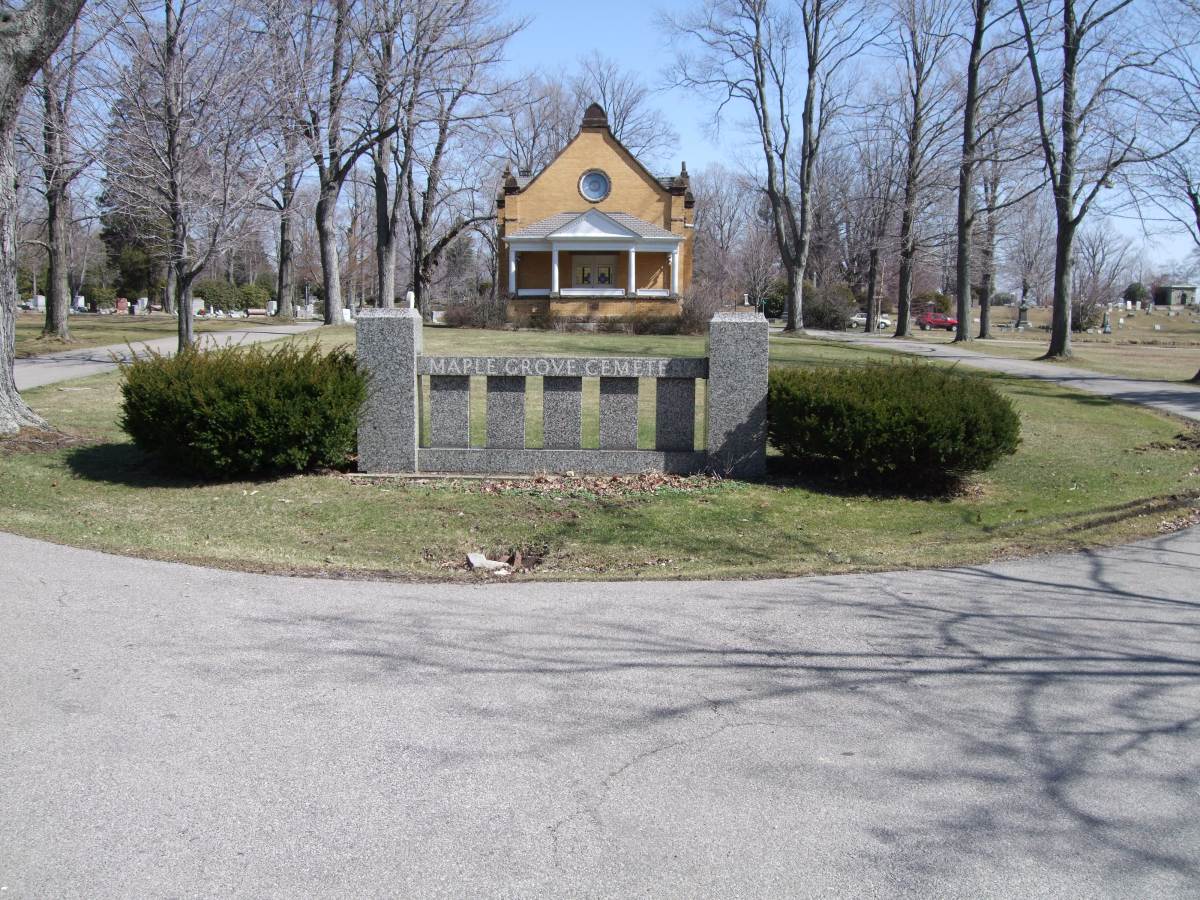
Maple Grove Cemetery
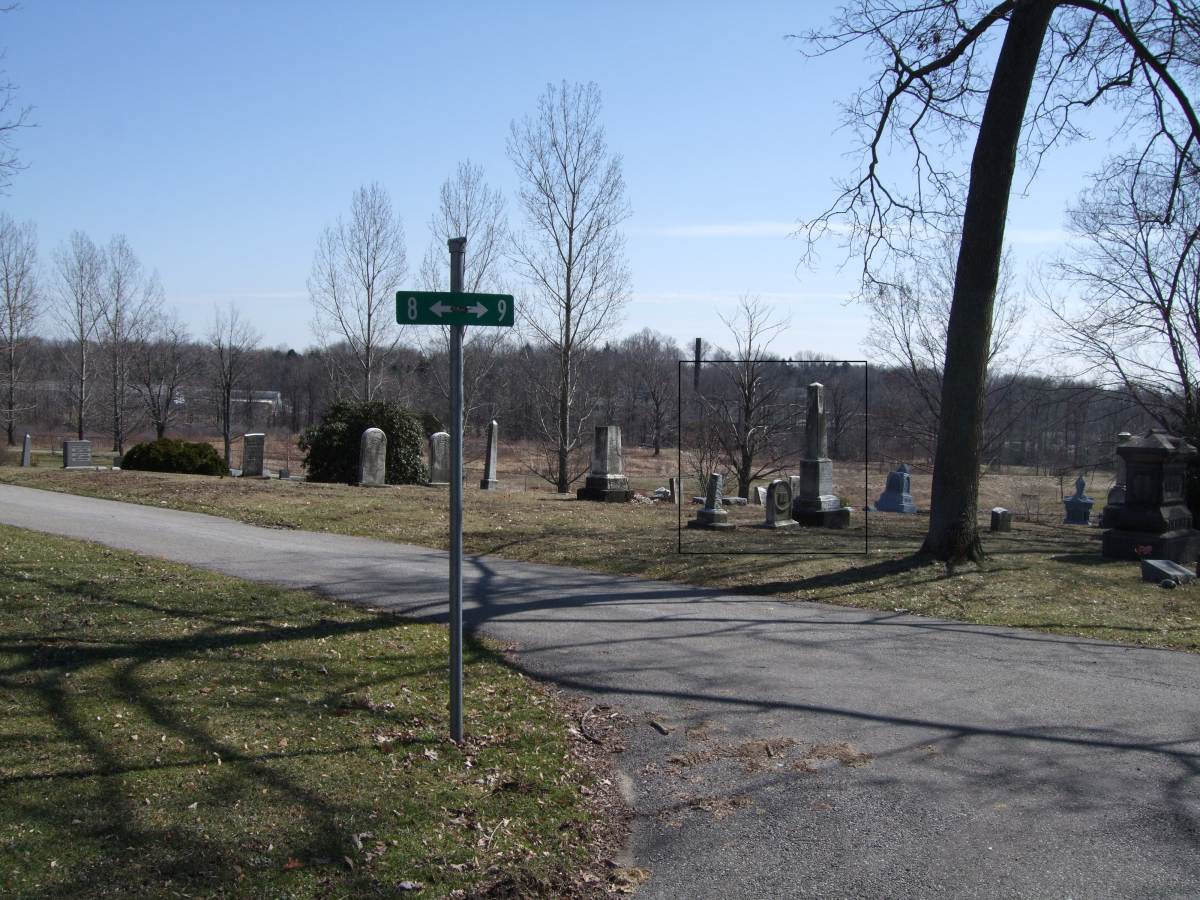
Almon Willard
A.W. Green
Mary
Wife of
Rev. A.B. Green
Died Mar. 21, 1869
Aged 58 Years
I have fought a good
fight, I have finished
my course
Son of
Almon B. & Mary Green
Died
June 23, 1863
Aged 17 yrs 9 mos 5d
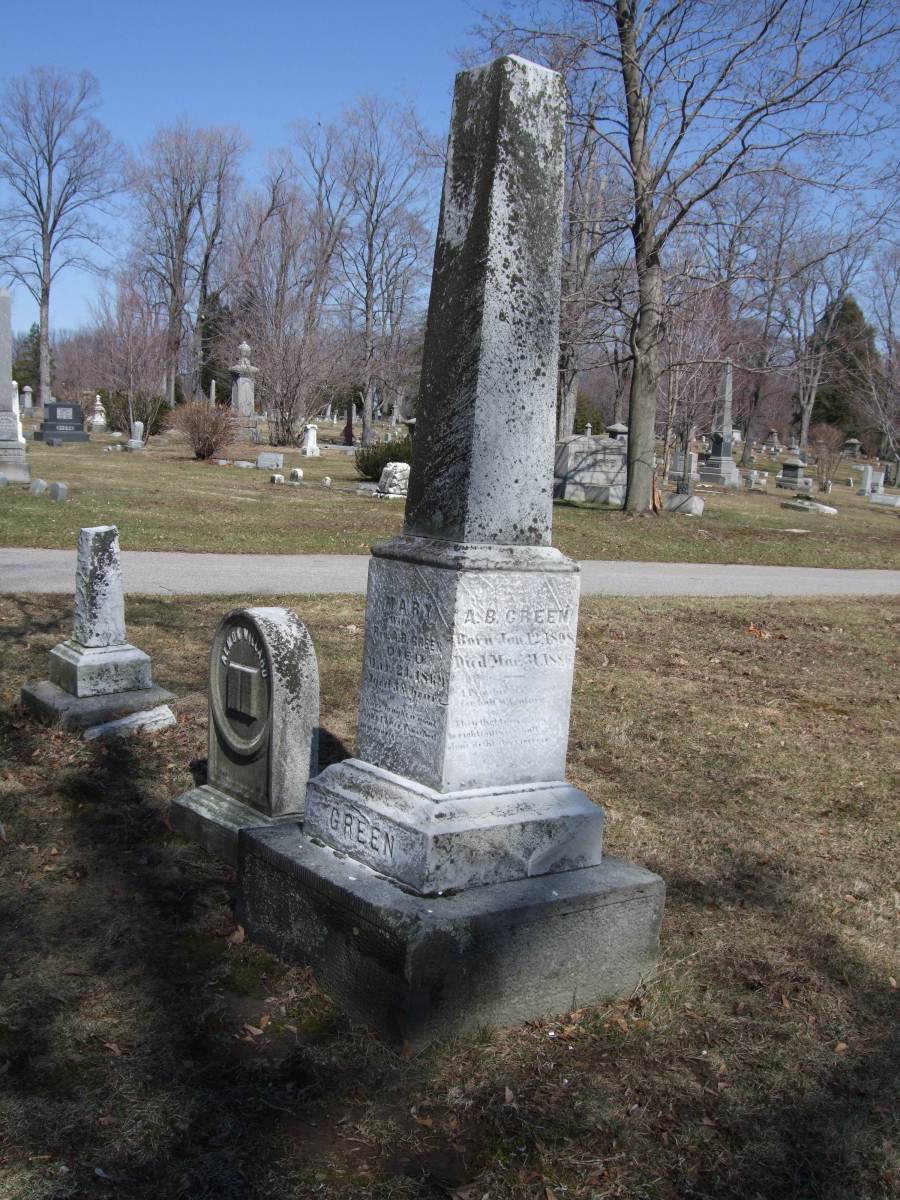
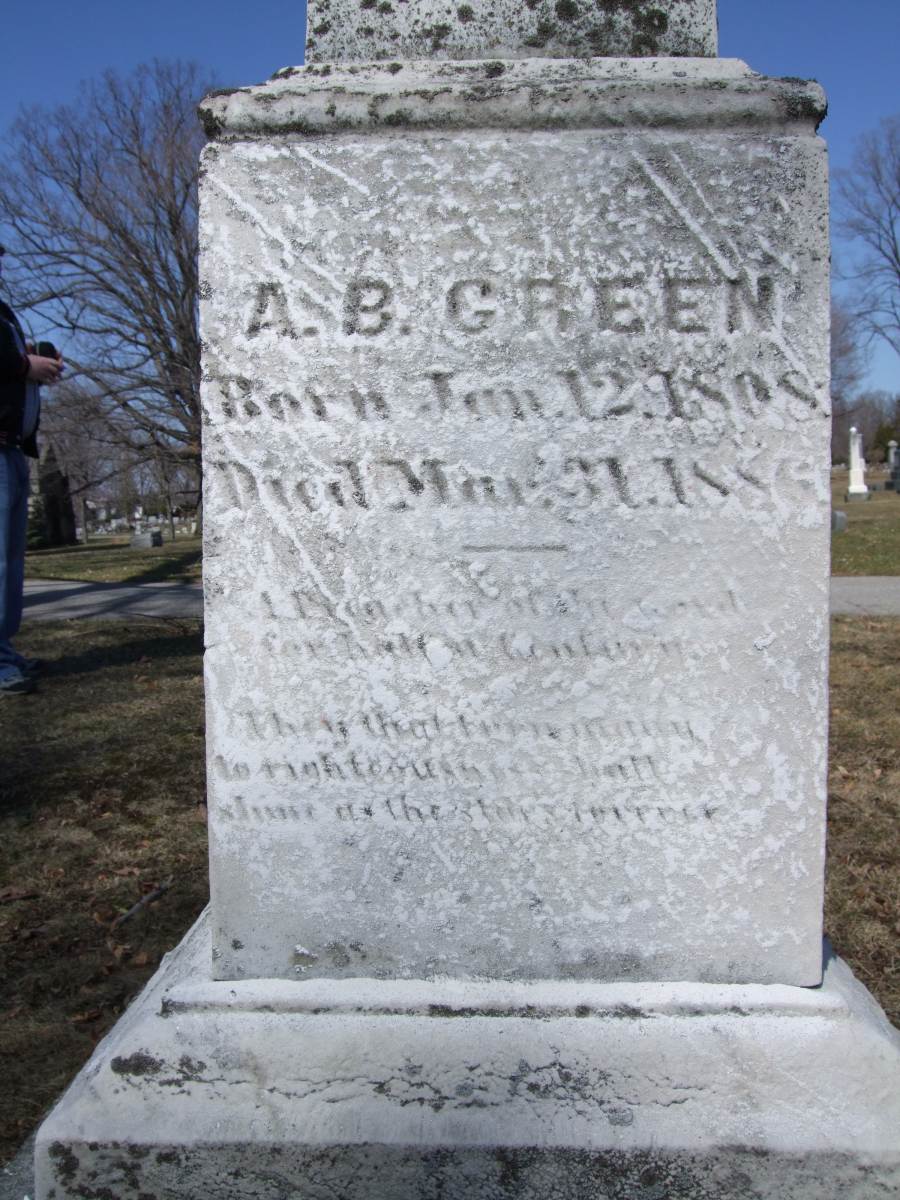
A.B. Green
Born Jan. 12, 1808
Died Mar. 31, 1886
A Preacher of the word
for half a Century
They that turn many
to righteousness shall
shine as the stars forever
![]()
